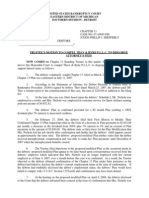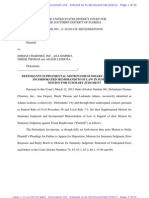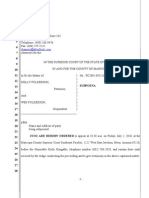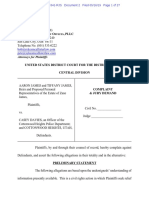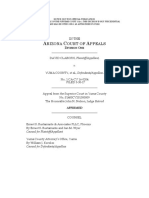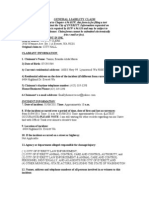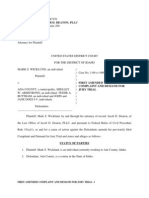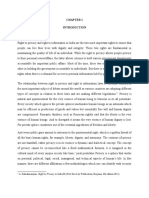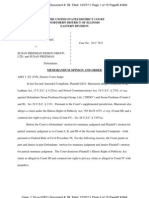Order Denying Motion To Dismiss
Order Denying Motion To Dismiss
Uploaded by
DeadspinCopyright:
Available Formats
Order Denying Motion To Dismiss
Order Denying Motion To Dismiss
Uploaded by
DeadspinOriginal Description:
Copyright
Available Formats
Share this document
Did you find this document useful?
Is this content inappropriate?
Copyright:
Available Formats
Order Denying Motion To Dismiss
Order Denying Motion To Dismiss
Uploaded by
DeadspinCopyright:
Available Formats
Case 1:16-cv-21156-MGC Document 30 Entered on FLSD Docket 08/29/2016 Page 1 of 2
UNITED STATES DISTRICT COURT
SOUTHERN DISTRICT OF FLORIDA
Case No. 16-21156-Civ-COOKE/TORRES
JASON PIERRE-PAUL,
Plaintiff,
vs.
ESPN INC., a foreign corporation, and
ADAM SCHEFTER, an individual,
Defendants.
___________________________________________/
ORDER ON DEFENDANTS MOTION TO DISMISS AFTER HEARING
THIS MATTER is before me on Defendant ESPN, Inc.s Motion to Dismiss (ECF No.
4). I have reviewed Defendants Motion to Dismiss, the record, the relevant legal authorities,
and the arguments made by the parties at the Motion Hearing on August 25, 2016. For the
reasons fully discussed at the Motion Hearing, it is hereby ORDERED and ADJUDGED that
Defendants Motion to Dismiss (ECF No. 4) is GRANTED in part and DENIED in part.
Plaintiff Jason Pierre-Pauls Count I against Defendants ESPN, Inc. and Adam Schefter
for violations under Floridas medical privacy law, Fla. Stat. 456.057, is DISMISSED with
prejudice. I do not believe Schefter is considered a third party under the relevant portion of the
statute. See Fla. Stat. 456.057(11). Reading the statute altogether, the constraints on thirdparty dissemination of medical information mainly curb the actions of health providers and the
parties outlined under the statute in Sections 456.607(7)(a) and 456.607(7)(d). The statute may
also cover other Florida state actors, see Daw v. Cowan, 2013 WL 5838683, at *9 (N.D. Fla. Oct.
30, 2013), but that addition would still not encompass a journalist like Schefter.
But Plaintiffs Counts II and III against Defendants for invasion of privacy and
respondeat superior remain. I find Plaintiff has properly pled facts, accepted as true at this
point, that allow me to reasonably infer Defendants improperly disclosed private facts to the
public. See Cape Publns., Inc. v. Hitchner, 549 So. 2d 1374, 1377 (Fla. 1989) (The elements [of
the tort of invasion of privacy by public disclosure of private facts] can be summarized as 1) the
publication, 2) of private facts, 3) that are offensive, and 4) are not of public concern.).
Defendants contend Plaintiffs medical records were newsworthy since they were connected to
1
Case 1:16-cv-21156-MGC Document 30 Entered on FLSD Docket 08/29/2016 Page 2 of 2
reports on Plaintiffs medical condition, which all parties agree was a legitimate public concern.
Though items of genuine public interest in a public figures life may legitimately extend, to
some reasonable degree, to further information concerning the individual and to facts about
him, which are not public . . .[t]he extent of the authority to make public private facts is not . . .
unlimited. RESTATEMENT (SECOND) OF TORTS 652D cmt. h (1977). The limits on disclosing
private facts are anchored to common decency, having due regard to the freedom of the press
and its reasonable leeway to choose what it will tell the public, but also due regard to the
feelings of the individual and the harm that will be done to him by the exposure. Id.
Here, Plaintiff has shown the publication of his private medical records may breach
these limits and, thus, are not a matter of public concern. Plaintiffs medical records were not
publically available; he did not consent to their use; and federal and state medical privacy laws,
though not directly applicable to Defendants, signal that an individuals medical records are
generally considered private. Separately, the circumstances surrounding the obtainment of
these medical records are in dispute. If Schefter secured Plaintiffs records unlawfully,
Defendants may not be afforded First Amendment protections that could otherwise apply in
publishing these records. See Bartnicki v. Vopper, 532 U.S. 514, 515 (2001) ([T]his Court upheld
the press right to publish information of great public concern obtained from documents stolen
by a third party. . . . It also left open the question whether, in cases where information has been
acquired unlawfully by a newspaper or by a source, government may punish not only the
unlawful acquisition, but also the ensuing publication.). Taken together, it is unwise to
dismiss these counts at this stage of the litigation.
Finally, Defendants request for attorneys fees under Floridas Anti-SLAPP statute, see
Fla. Stat. 768.295, is denied. Assuming the statute applies, this suit plainly has merit since
two of its original three counts remain.
DONE and ORDERED in Chambers, at Miami, Florida, on this 29th day of August
2016.
Copies furnished to:
Edwin G. Torres, U.S. Magistrate Judge
Counsel of Record
2
You might also like
- Approsheets - Torts UpdateDocument2 pagesApprosheets - Torts Updatelawstudent6669No ratings yet
- Angie Harmon's Civil Lawsuit Against Instacart, Delivery ShopperDocument11 pagesAngie Harmon's Civil Lawsuit Against Instacart, Delivery ShopperWCNC DigitalNo ratings yet
- Green SettlementDocument7 pagesGreen SettlementABC15 NewsNo ratings yet
- Harris v. City of St. Louis PetitionDocument14 pagesHarris v. City of St. Louis PetitionMarianne MartinezNo ratings yet
- Motion For DisgorgementDocument3 pagesMotion For Disgorgementattorneyinmichigan@yahoo.com100% (1)
- Moses's Lawyers' Motion Sent To The JudgeDocument9 pagesMoses's Lawyers' Motion Sent To The JudgeNews10NBCNo ratings yet
- Rochester. RPD Subpoena - Corrected (00432840x9ccc2)Document8 pagesRochester. RPD Subpoena - Corrected (00432840x9ccc2)News 8 WROCNo ratings yet
- (Steve Nodine Case) Motion To Dismiss - Prosecutorial MisconductDocument3 pages(Steve Nodine Case) Motion To Dismiss - Prosecutorial MisconductWKRGTVNo ratings yet
- Judge David Reader Motion COADocument55 pagesJudge David Reader Motion COALansingStateJournal50% (2)
- Defendants Supplemental Motion For Summary Judgment and Incorporated Memorandum of Law in Support of Motion For Summary JudgmentDocument25 pagesDefendants Supplemental Motion For Summary Judgment and Incorporated Memorandum of Law in Support of Motion For Summary JudgmentcinaripatNo ratings yet
- De La Hoya LawsuitDocument10 pagesDe La Hoya LawsuitDeadspinNo ratings yet
- Petition for Certiorari: Denied Without Opinion Patent Case 93-1413From EverandPetition for Certiorari: Denied Without Opinion Patent Case 93-1413No ratings yet
- Annabel K Melongo Response To Cook County Motion To DismissDocument12 pagesAnnabel K Melongo Response To Cook County Motion To Dismissanacondakay044No ratings yet
- Rakieten V SeniorDocument16 pagesRakieten V SeniorTHROnlineNo ratings yet
- DocDocument28 pagesDocWCPO 9 News100% (1)
- Human Rights AlertDocument5 pagesHuman Rights AlertHuman Rights Alert - NGO (RA)100% (1)
- Troy Allen Large - Jane Doe 3Document5 pagesTroy Allen Large - Jane Doe 3ABC15 NewsNo ratings yet
- Department of Justice's Findings Regarding Pattern of Discrimination by L.A. County Sheriff's Deputies in The Antelope ValleyDocument46 pagesDepartment of Justice's Findings Regarding Pattern of Discrimination by L.A. County Sheriff's Deputies in The Antelope ValleyLos Angeles Daily NewsNo ratings yet
- Plaintiffs' Response To Defendants' Motion To Dismiss And, Alternatively, Motion To Strike Portions of Plaintiffs' ComplaintDocument6 pagesPlaintiffs' Response To Defendants' Motion To Dismiss And, Alternatively, Motion To Strike Portions of Plaintiffs' ComplaintOmar Rodriguez OrtizNo ratings yet
- Subpeona SampleDocument4 pagesSubpeona SamplebrianfoutzNo ratings yet
- Opposition To Defendant Flores' Motion For Summary JudgmentDocument19 pagesOpposition To Defendant Flores' Motion For Summary JudgmentJames Alan Bush100% (1)
- James ComplaintDocument27 pagesJames ComplaintAnonymous WCaY6rNo ratings yet
- Guardiola Wrongful Death LawsuitDocument28 pagesGuardiola Wrongful Death LawsuitNews10NBCNo ratings yet
- Gregory Heard v. Greg Dulayev, Et. Al.Document19 pagesGregory Heard v. Greg Dulayev, Et. Al.Michael_Lee_RobertsNo ratings yet
- Ramarley Graham FOIL AppealDocument9 pagesRamarley Graham FOIL AppealNPNo ratings yet
- Ismael Lopez City Motion To DismissDocument27 pagesIsmael Lopez City Motion To DismissNational Content Desk0% (1)
- Terry Thomas - COMPLAINTDocument80 pagesTerry Thomas - COMPLAINTpolychromeNo ratings yet
- FOIA Email ChainDocument6 pagesFOIA Email ChainABC15 NewsNo ratings yet
- Denver Diner Case: Plaintiffs Response To Defendant City and County of Denvers Motion For Summary JudgmentDocument40 pagesDenver Diner Case: Plaintiffs Response To Defendant City and County of Denvers Motion For Summary JudgmentMichael_Lee_RobertsNo ratings yet
- Plaintiffs' Opposition To Defendants' Joint Motion To Dismiss W ExhibitsDocument101 pagesPlaintiffs' Opposition To Defendants' Joint Motion To Dismiss W ExhibitsKUTV 2NewsNo ratings yet
- Amended Lawsuit ComplaintDocument17 pagesAmended Lawsuit ComplaintThe Press-Enterprise / pressenterprise.comNo ratings yet
- Myrtle Beach Police Department's Body Camera PolicyDocument8 pagesMyrtle Beach Police Department's Body Camera PolicyMadison MartinNo ratings yet
- Summons (Wrongful Death and Survival Action) J T D: Attorneys For PlaintiffsDocument10 pagesSummons (Wrongful Death and Survival Action) J T D: Attorneys For PlaintiffsABC15 NewsNo ratings yet
- 7/26/19 Interrogatory To Richard Bosley, Sergeant of The Jackson Township Police Dept (NJ)Document19 pages7/26/19 Interrogatory To Richard Bosley, Sergeant of The Jackson Township Police Dept (NJ)Paul C WilliamsNo ratings yet
- United States v. Dailin Pico Rodriguez, 11th Cir. (2012)Document12 pagesUnited States v. Dailin Pico Rodriguez, 11th Cir. (2012)Scribd Government DocsNo ratings yet
- Pre TrialDocument4 pagesPre TrialDevika SuppiahNo ratings yet
- Karon Hylton-Brown LawsuitDocument60 pagesKaron Hylton-Brown Lawsuitwamu885No ratings yet
- Crumpton v. Podolak, 10th Cir. (2006)Document10 pagesCrumpton v. Podolak, 10th Cir. (2006)Scribd Government DocsNo ratings yet
- Final Motion For SanctionsDocument17 pagesFinal Motion For SanctionsjkalvenNo ratings yet
- 9th Attempt To Revoke Guy Neighbors Bond in The Yellow House CaseDocument3 pages9th Attempt To Revoke Guy Neighbors Bond in The Yellow House CaseJones, WalkerNo ratings yet
- Yomade Aborishade - Statement of FactsDocument3 pagesYomade Aborishade - Statement of FactsEmily BabayNo ratings yet
- Charles Green Lawsuit Against Timmonsville PoliceDocument7 pagesCharles Green Lawsuit Against Timmonsville PoliceABC15 NewsNo ratings yet
- Former Collin County Judge Cleared of Bribery Suing Those Who Orchestrated Wrongful ConvictionDocument32 pagesFormer Collin County Judge Cleared of Bribery Suing Those Who Orchestrated Wrongful Convictionwfaachannel8100% (1)
- Gary Lavine v. DA William Fitzpatrick - Counsel's Visceral Reply (Index No. 0149-2020)Document4 pagesGary Lavine v. DA William Fitzpatrick - Counsel's Visceral Reply (Index No. 0149-2020)Desiree YaganNo ratings yet
- Lawsuit: Jennifer Merrow Vs Monroe County Sheriff's Department OfficialsDocument5 pagesLawsuit: Jennifer Merrow Vs Monroe County Sheriff's Department OfficialsRochester Democrat and ChronicleNo ratings yet
- Rizona Ourt of PpealsDocument7 pagesRizona Ourt of PpealsScribd Government DocsNo ratings yet
- Just Us Realtors V Nudge BLAIR JACKSON IndividuallyDocument21 pagesJust Us Realtors V Nudge BLAIR JACKSON IndividuallyTriton007No ratings yet
- Austin Sullivan - Complaint For DamagesDocument19 pagesAustin Sullivan - Complaint For DamagesshreveporttimesNo ratings yet
- Court Filing Against Bella Collina, Randall Greene and Dwight ScharDocument25 pagesCourt Filing Against Bella Collina, Randall Greene and Dwight ScharDon Juravin (Don Karl Juravin)No ratings yet
- 5 4 21 Christopher Worrell Motion To TransferDocument29 pages5 4 21 Christopher Worrell Motion To TransferLaw&CrimeNo ratings yet
- Santa Barbara County Sheriff's Office Federal Wrongful Death Lawsuit Filed August 13, 2018Document11 pagesSanta Barbara County Sheriff's Office Federal Wrongful Death Lawsuit Filed August 13, 2018Dave MinskyNo ratings yet
- City of Everett Tort ClaimDocument15 pagesCity of Everett Tort ClaimFinally Home RescueNo ratings yet
- New Amended Complaint 1Document11 pagesNew Amended Complaint 1allforaccountabilityNo ratings yet
- Joint Scheduling Report Draft 2 FINALDocument4 pagesJoint Scheduling Report Draft 2 FINALOrlando Tea PartyNo ratings yet
- Anderson v. Kitchen, 10th Cir. (2010)Document8 pagesAnderson v. Kitchen, 10th Cir. (2010)Scribd Government DocsNo ratings yet
- United States District Court For The District of ColumbiaDocument16 pagesUnited States District Court For The District of ColumbiastillaireNo ratings yet
- In Re David E., Ariz. Ct. App. (2016)Document3 pagesIn Re David E., Ariz. Ct. App. (2016)Scribd Government DocsNo ratings yet
- Joint Statement On Discovery Disputes CombinedDocument711 pagesJoint Statement On Discovery Disputes CombinedVozMedia100% (1)
- Illinois Judge Charles Reynard Screwed Alan Beaman and Donna Gaston Pt. 2Document27 pagesIllinois Judge Charles Reynard Screwed Alan Beaman and Donna Gaston Pt. 2Christopher KingNo ratings yet
- Petition for Certiorari Denied Without Opinion: Patent Case 98-1972.From EverandPetition for Certiorari Denied Without Opinion: Patent Case 98-1972.No ratings yet
- Tuffy's Way - Race - Jan 11Document15 pagesTuffy's Way - Race - Jan 11DeadspinNo ratings yet
- Mike Petke vs. Utah Soccer, LLC, D/b/a Real Salt LakeDocument40 pagesMike Petke vs. Utah Soccer, LLC, D/b/a Real Salt LakeDeadspinNo ratings yet
- Kimberly B - Race - Jan 11Document9 pagesKimberly B - Race - Jan 11DeadspinNo ratings yet
- Ciao . We Invite You To Join UsDocument1 pageCiao . We Invite You To Join UsDeadspinNo ratings yet
- Bucs Fifth Circuit Denial 5/24/19Document8 pagesBucs Fifth Circuit Denial 5/24/19DeadspinNo ratings yet
- Lightning Redacted Fifth Circuit Ruling 3/29/19Document7 pagesLightning Redacted Fifth Circuit Ruling 3/29/19DeadspinNo ratings yet
- Mumphery SettlementDocument7 pagesMumphery SettlementDeadspinNo ratings yet
- Adrian Peterson LawsuitDocument6 pagesAdrian Peterson LawsuitDeadspinNo ratings yet
- NFL Concussion Settlement Claims Report 4/1/19Document6 pagesNFL Concussion Settlement Claims Report 4/1/19DeadspinNo ratings yet
- FCC Complaints Stanley Cup Game 7Document7 pagesFCC Complaints Stanley Cup Game 7DeadspinNo ratings yet
- Pappas DocketDocument8 pagesPappas DocketDeadspinNo ratings yet
- Fifth Circuit Bucs Confidentiality Ruling 3/29/19Document5 pagesFifth Circuit Bucs Confidentiality Ruling 3/29/19Deadspin100% (1)
- James Jordan Federal AffidavitDocument6 pagesJames Jordan Federal AffidavitScott CroteauNo ratings yet
- Choi DocumentsDocument5 pagesChoi DocumentsDeadspinNo ratings yet
- Lightning Unredacted Fifth Circuit Ruling 3/20/19Document7 pagesLightning Unredacted Fifth Circuit Ruling 3/20/19DeadspinNo ratings yet
- Seeger Response To Reconsideration Motion 4/25/19Document7 pagesSeeger Response To Reconsideration Motion 4/25/19DeadspinNo ratings yet
- Kraft Contempt MotionDocument35 pagesKraft Contempt MotionDeadspin100% (1)
- Reconsideration Motion 4/25/19Document19 pagesReconsideration Motion 4/25/19DeadspinNo ratings yet
- Garretson Group Report 2/28/19Document11 pagesGarretson Group Report 2/28/19DeadspinNo ratings yet
- Randall Kaplan Victim Impact StatementDocument18 pagesRandall Kaplan Victim Impact StatementDeadspinNo ratings yet
- BrownGreer Response To Reconsideration 5/3/19Document27 pagesBrownGreer Response To Reconsideration 5/3/19DeadspinNo ratings yet
- Madison Kaplan Victim Impact StatementDocument3 pagesMadison Kaplan Victim Impact StatementDeadspinNo ratings yet
- Robert Kraft Protective OrderDocument10 pagesRobert Kraft Protective OrderDeadspinNo ratings yet
- OrderDocument3 pagesOrderDeadspinNo ratings yet
- Declaration of James Naylor in Support of Defendant'S Opposition To Plaintiff'S Motion To RemandDocument13 pagesDeclaration of James Naylor in Support of Defendant'S Opposition To Plaintiff'S Motion To RemandDeadspinNo ratings yet
- NessDocument4 pagesNessDeadspinNo ratings yet
- Old MAF Rules 6/4/18Document7 pagesOld MAF Rules 6/4/18DeadspinNo ratings yet
- BrownGreer Response To Tighe 3/11/19Document28 pagesBrownGreer Response To Tighe 3/11/19DeadspinNo ratings yet
- New MAF Physicians Rules 4/11/19Document15 pagesNew MAF Physicians Rules 4/11/19DeadspinNo ratings yet
- The Unwanted Gaze: Right To Privacy in Philippine Law: by Atty. Rafael E. KhanDocument5 pagesThe Unwanted Gaze: Right To Privacy in Philippine Law: by Atty. Rafael E. KhanManuel WaykuratNo ratings yet
- Privacy in The WorkplaceDocument3 pagesPrivacy in The WorkplaceGabriel Mellar NaparatoNo ratings yet
- Publicity Isn'T Really Public (Midterm Paper in Intellectual Property Law)Document4 pagesPublicity Isn'T Really Public (Midterm Paper in Intellectual Property Law)Kristel Mae BunaganNo ratings yet
- Nursing Jurisprudence and Ethics: Tercero, Ferdinand C., BSN, RN, RN "Terz"Document50 pagesNursing Jurisprudence and Ethics: Tercero, Ferdinand C., BSN, RN, RN "Terz"Terzky TerceroNo ratings yet
- Legal Issues Re: Use of Drones in U.S.Document25 pagesLegal Issues Re: Use of Drones in U.S.KING 5 News100% (1)
- People v. CabalquintoDocument1 pagePeople v. CabalquintoMylene Gana Maguen Manogan0% (1)
- Shardha Appellant Team Code Sls026Document38 pagesShardha Appellant Team Code Sls026Mukesh LalNo ratings yet
- Developing UK Law of Privacy - Ideas, Considerations & ConcernsDocument95 pagesDeveloping UK Law of Privacy - Ideas, Considerations & ConcernsjoanabudNo ratings yet
- Chapter 1-2Document25 pagesChapter 1-2Sharma ShalluNo ratings yet
- NPC Advisory No. 2022-01: Republic of The PhilippinesDocument8 pagesNPC Advisory No. 2022-01: Republic of The Philippinesupload emailNo ratings yet
- Huckabee Beach LawsuitDocument24 pagesHuckabee Beach LawsuitLaw&CrimeNo ratings yet
- Other Forms of IPRDocument14 pagesOther Forms of IPRsaurav singhNo ratings yet
- Invasion of Privacy TortsDocument4 pagesInvasion of Privacy Tortsx3pia100% (1)
- Ch09 - Mukul - CRC Press Contributor AgreementDocument2 pagesCh09 - Mukul - CRC Press Contributor AgreementSudipta GhoshNo ratings yet
- Vipul Patel vs. Zillow Zestimate Lawsuit DismissalDocument27 pagesVipul Patel vs. Zillow Zestimate Lawsuit DismissalGeekWireNo ratings yet
- Order Denying Motion To DismissDocument2 pagesOrder Denying Motion To DismissDeadspinNo ratings yet
- Cfu#8 BioethicsDocument2 pagesCfu#8 BioethicsjustinjareddNo ratings yet
- Rules and Regulations Implementing The Rape Victims Assistance and Protection ActDocument10 pagesRules and Regulations Implementing The Rape Victims Assistance and Protection ActCesar ValeraNo ratings yet
- Download ebooks file The Law of Journalism and Mass Communication 7th Edition Susan D Ross Amy L Reynolds Robert E Trager all chaptersDocument50 pagesDownload ebooks file The Law of Journalism and Mass Communication 7th Edition Susan D Ross Amy L Reynolds Robert E Trager all chaptersslaghsundtvs100% (4)
- CCPRDocument21 pagesCCPRdarshanNo ratings yet
- Employment Outline 1Document26 pagesEmployment Outline 1seabreezeNo ratings yet
- PRISM ClassDocument24 pagesPRISM Classlysobit80% (5)
- Court Approved Wells Fargo Stip Judgment 3-28-16 - 0Document9 pagesCourt Approved Wells Fargo Stip Judgment 3-28-16 - 0Mihaela HristodorNo ratings yet
- Spouses Hing Vs Choachuy GR 179736Document6 pagesSpouses Hing Vs Choachuy GR 179736Miguel Joshua Gange AguirreNo ratings yet
- Maremont v. SFDG, 10 - C 7811 (N.D. Ill. Dec. 7, 2011)Document15 pagesMaremont v. SFDG, 10 - C 7811 (N.D. Ill. Dec. 7, 2011)Venkat BalasubramaniNo ratings yet
- E3-Assignment 2Document2 pagesE3-Assignment 2Munawar AliNo ratings yet
- Consti TranscriptionDocument35 pagesConsti TranscriptionjaolimNo ratings yet
- Spilfogel v. Fox Broadcasting Company Etc., 11th Cir. (2011)Document6 pagesSpilfogel v. Fox Broadcasting Company Etc., 11th Cir. (2011)Scribd Government DocsNo ratings yet




